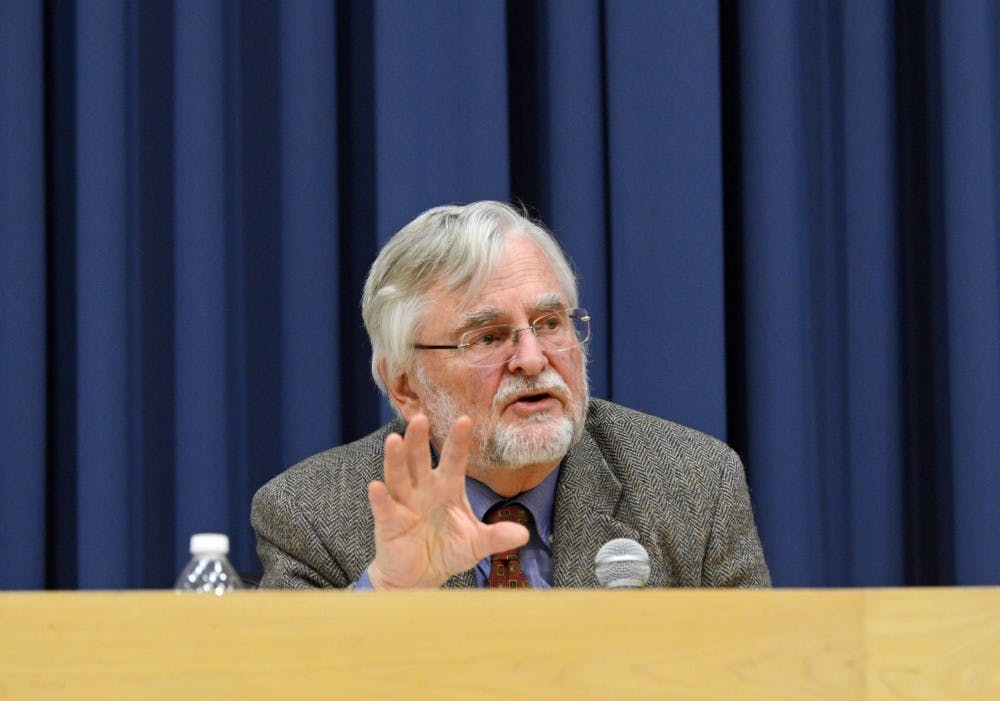As the United States debates what its role ought to be in the international community, completely withdrawing from involvement in foreign affairs is not the answer, said SergeSchmemann, editorial page editor of the International New York Times. He discussed America’s international role and the current state of international journalism in a lecture on Tuesday evening.
Schmemann has spent the past 10 years working for the International Herald Tribune, now branded as the International New York Times, based in Paris. He won a Pulitzer Prize in international reporting in 1991 for his coverage of the German reunification.
“This cannot happen. The United States cannot withdraw from the world. It will not,” he said. “The world will keep coming back. Every crisis will require some application of American hard or soft power,” he said. “Even if we do drop out, there is no one to take our place.”
“In the view of the world, we have often failed to live up to our own ideals — fighting dubious wars, exporting people to be tortured,” he said. “Are we taking up the bad guys, are we violating international law or are we doing both?”
Regarding one of the most closely watched conflicts in today’s world, Schmemann said many critics of the United States have accused the superpower of not aiding the Syrian people because recent experiences in Iraq and Afghanistan have torn up the American consciousness.
“Right now people are asking questions about America: Is America really devoted to human rights?Is American democracy really the answer? If you can’t make it work in America, if you can’t live up to your own standards, why should we bother?” Schmemann said.
China is still trying to figure out how to cope with its power, Schmemann said. Right now, it isn’t a bad thing for the United States to hold back from engaging in more conflicts.
“A period of reflection is a good thing,” he said. “For us, a period of withdrawing to digest what has happened in Iraq and Afghanistan is probably the wisest thing to do.”

The United States has always debated the balance between hard and soft power, he explained, noting that it has supported fascist dictators and regimes.
“In most of these cases, I believe that we have acted honorably,” he said. “Many of these things that we do we do because we really believe they are the right actions.”
After serving in Vietnam under the draft, Schmemann became interested in journalism and covering foreign affairs.
“To allow yourself to be drafted in the '60s was already a huge statement,” Schmemann said. “Vietnam was the formative force of the '60s. You were defined by how you stood and whether you thought the war was totally immoral.”

Schmemann said he is disappointed that the United States does not use a draft, which he called a critical aspect of any democracy. Had he not been drafted, he said, he would never have served in the war and never would have gained the perspective he did.
“I was unable to muster any really strong feelings one way or the other. I could never really decide whether the war was moral or immoral. These were just categories to me that didn’t seem to apply. I was always curious why we were in [Vietnam]. What is this country we are trying to fight?” Schmemann explained. “Explaining this bizarre situation was really all I wanted to do.”
Schmemman likened popular criticisms of today’s press, such as those about publishing information on WikiLeaks and writing about Edward Snowden’s disclosures regarding government surveillance, to the way people criticized the press for its lack of support for the Vietnam War.
Schmemann said that journalism has progressed to become more opinionated in recent years, suggesting that even news stories hold strong leanings one way or another.
He also noted there is a deficiency of foreign correspondents around the world.
“At this time when we most need an intelligent eye on the world, there are very few people covering these issues,” he said.
Often media outlets will send reporters into countries to cover a war or crisis, but there is a lack of American reporters living in countries where the United States should be covering news every day, he added.
Schmemann advised the audience to learn the critical languages of countries where there is a lack of coverage and “try to see the world from the perspective of those cultures.”
“By the time you get a paper, you want to know why something happened. You already know it happened,” Schmemann explained. He said that news analysis is the critical area of need today and that impartiality is the goal.
Schmemann previously served as a Ferris Professor of Journalism at the University. His lecture, sponsored by the American Whig-Cliosophic Society, took place in Whig Hall onTuesday evening.








